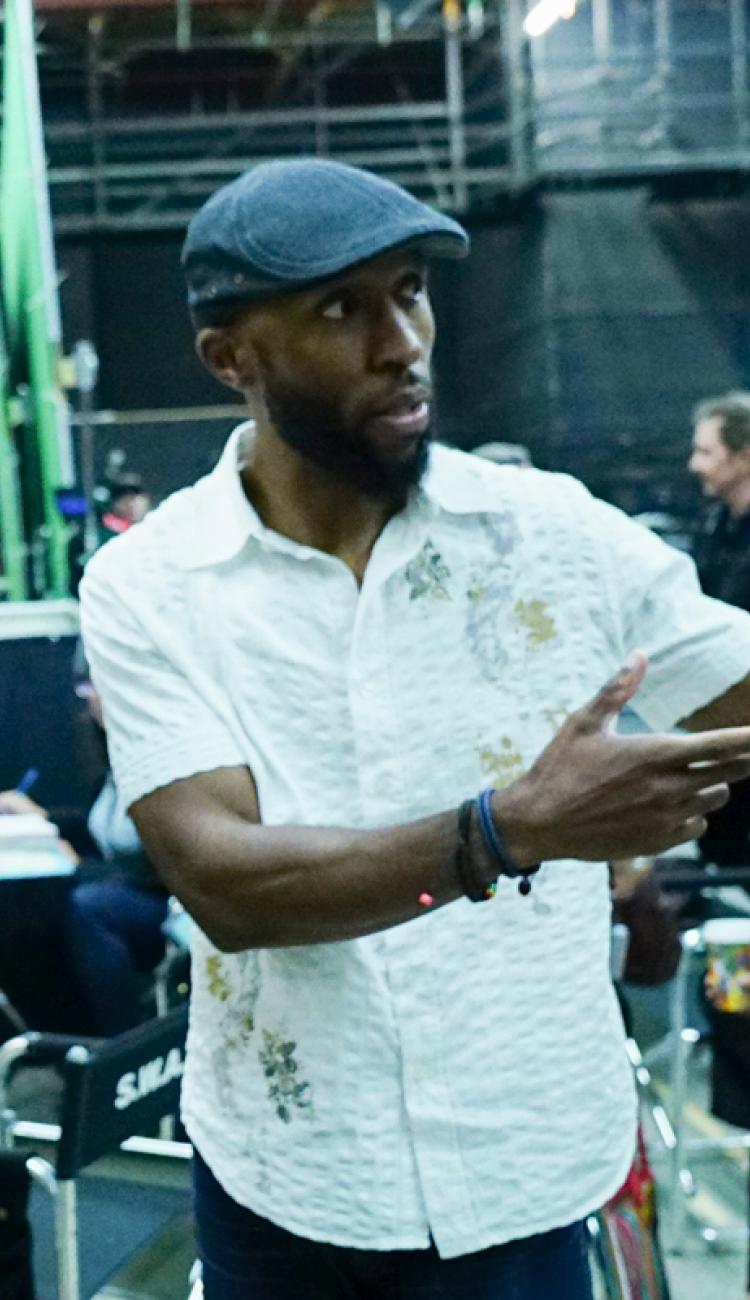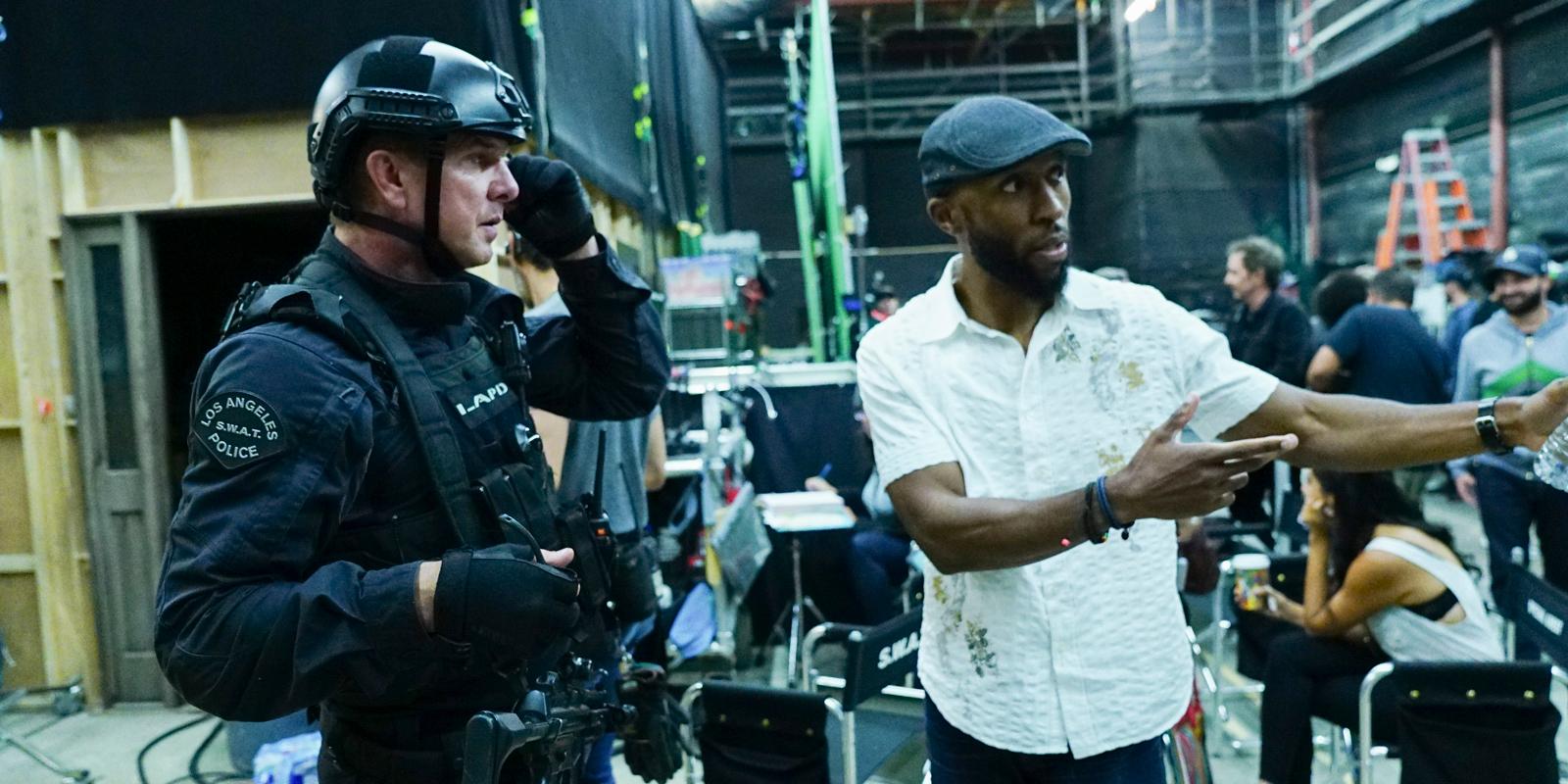Feb 23, 2021
Aaron Rahsaan Thomas describes his journey from the ViacomCBS Writers Mentoring Program to co-creating CBS’ "S.W.A.T."
Early in his writing career, Aaron Rahsaan Thomas didn’t know how he was going to make a living. When he was selected for the ViacomCBS Global Inclusion Writers Mentoring Program, he found the guidance he needed.
“I had a solid education,” says Thomas, now the co-creator and executive producer of CBS’ S.W.A.T. “But the program provided me with things I didn't learn in school—things writers of color rarely get from the business itself.”
In its nearly two decades, more than 100 emerging diverse writers have graduated from the Writers Mentoring Program, which focuses on helping new diverse voices break into the TV business. As part of the eight-month program, writers develop a new script with the help of an executive mentor. They also participate in a 16-week workshop about the industry, with access to agents, managers, producers, and showrunners.
Many of the program’s alumni have gone on to become executive producers and showrunners on various television series. Before S.W.A.T., Thomas wrote for shows such as Numb3rs, CSI:NY and SouthLAnd, Sleepy Hollow, and The Get Down on Netflix. Now, in addition to running the S.W.A.T. writer’s room—which includes four fellow writing program alumni—he also teaches screenwriting at his alma mater USC.
Thomas spoke with the ViacomCBS Newsroom about how the program helped him and how the S.W.A.T. writers ground the show with real-life issues.
Kelby Clark: What led you to apply to the Writers Mentoring Program?
Aaron Rahsaan Thomas: When I was in grad school at USC, one of my internships was with the writing staff of Soul Food: The Series, which aired on SHOWTIME. After the internship wrapped, they hired me as a writer's assistant, and I assumed I was set in terms of my career. That was not the case. Often, the second job is the hardest job to get in this business.
When the show ended its final season, I was back at square one. A friend of mine had done the Writers Mentoring Program at CBS, and recommended it to me as a way to sharpen my business skills. I applied and submitted a spec CSI episode, about a man who dies from a snake bite to his buttocks that Gil Grissom and the team have to investigate. I was fortunate enough to get in.
KC: How did your time in the program help to prepare you for a career in the TV business?
ART: Through the program, I was able to network with people and be immersed in a writers’ room, day in and day out. The program connected me with three specific mentors, and I learned something different from each of them.
First, I was paired with Sarah Goldfinger, a writer for CSI. Working with her, I saw the importance of energy in a room. You have to be able to bounce back with more ideas. Then, there was Glenn Geller, who was vice president of current programs when I met him. Glenn taught me to pay attention to detail.
Prepare for meetings thoroughly, conduct meetings efficiently, and present yourself in a professional way. In fact, Glenn recommended my agent to me, the same agent I have today. And years later, when Glenn was president of CBS Entertainment, I sold S.W.A.T. to Glenn—talk about a full-circle career moment.
These things can be the difference between getting a job or not. They don't tell you that before you come out to Hollywood. You need to learn it somewhere. With writers of color especially, that's the key: looking for those places that give you insider information. It reminds me of when I attended private high school. There were certain things that wealthy white kids knew about life, money, and college that kids from my neighborhood never learned. It had nothing to do with lack of intelligence. It was a lack of resources.
Programs like ViacomCBS’ can provide that insight to writers who may not receive it otherwise. Through the program I was staffed on my first television show, Friday Night Lights, and that’s pretty much where my career began.
"You're always told as a writer to write what you know, but that's easier said than done when what you know is not represented anywhere."
KC: What were some obstacles you faced as a Black writer in a predominately white industry?
ART: In the beginning, my biggest challenges were the mental hurdles. Owning my space in the room, and doubting that people in this business were going to be ready for or receptive to my voice. You're always told as a writer to write what you know, but that's easier said than done when what you know is not represented anywhere.
During my time at the program, the screenwriter and producer Charles Murray was a guest speaker. He was a successful Black male writer in the dramatic space—that was rare at the time. He taught me to have the audacity to be my unique self, even if no one around is quite like me.
I always knew that my story was valid. But I didn’t know if there was a place for my point of view. At the end of the day, most stories do have universal elements at their heart. Once I understood that, my approach to writing definitely changed.
KC: Do you feel you have a dual role as an entertainer and a voice for your community?
ART: As a writer of color especially, there's always a plane flying overhead—my responsibility is not simply to entertain but to engage my audiences. S.W.A.T. was born from that notion.
I didn't want the main character, Daniel ‘Hondo’ Harrelson, played by Shemar Moore, to be a cop who also happened to be Black. He is a Black man. He aspires to bridge the gap between his community and the police. But he’s still Black. He has a Black family, he goes home to a Black neighborhood, and he faces challenges that people in the Black community face. Growing up as a young, Black male, I'd never really seen that represented, especially not from the point of view of someone from that community. S.W.A.T. is a show that definitely deals with the fantastic in how law enforcement saves the city from large threats. We try to ground it with real-life issues that Black communities face.
KC: What advice do you have for writers of color who are trying to break into TV?
ART: I have an appreciation for the journey of writers of color, especially on CBS series. I've lived that. I understand it. My advice to any writers who are coming up is this: work on your craft constantly; love what you do; and, most importantly, find a community of writers you can lean on. People you can vent to and get advice from in a safe space. Realize that you are not alone. What makes you strong is the system around you.




